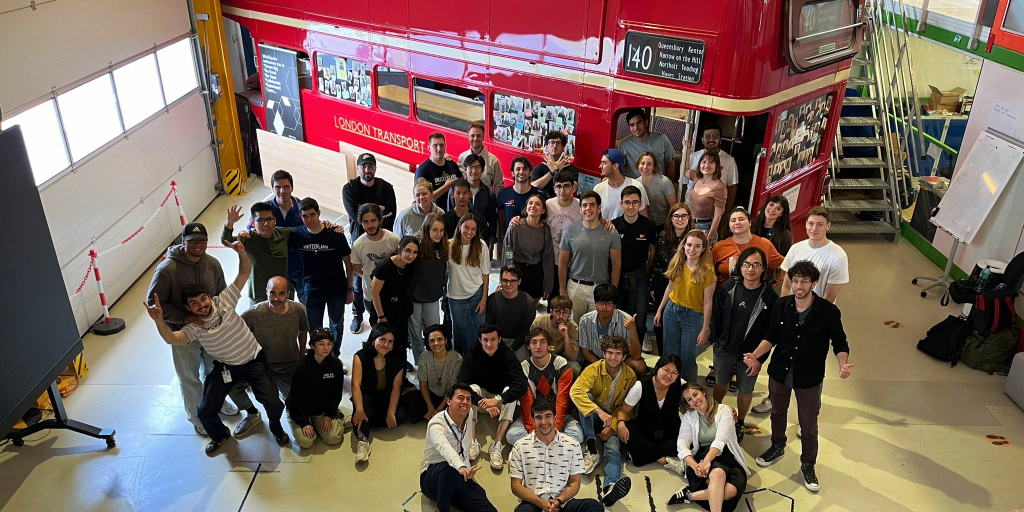Fusion Point IdeaSquare Planet programme: a new approach to innovation and problem-solving for the near future

The IdeaSquare Planet (i2Planet) pilot programme is a disruptive innovation course that seeks to elevate students’ knowledge, skills, and problem-solving abilities in connection with the Sustainable Development Goals, and to challenge their assumptions about the future. At its core, this approach hinges on a bold question: What if humanity were compelled to start anew on an entirely different planet? How could we make choices that prioritise sustainability? Moreover, could the knowledge gained during this cosmic journey be applied effectively to solve real-world challenges on Earth?
The programme is co-designed by IdeaSquare, the innovation space at CERN, and the partner institutions it collaborates with. Each course is tailored to the specific needs of the institutions’ curricula. Recently, a pilot was co-designed with Fusion Point, which is a collaboration between Esade Business School, UPC and IED Barcelona. The objective was to challenge students to apply their expertise in, among others, engineering, design, business, agri-food engineering, and innovation to address critical issues related to survival, societal organisation, scarcity of resources, and extreme environmental conditions.
This course introduces students to a simulated scenario where humanity must establish a sustainable existence on a new “Planet Y” and needs to solve some specific challenges for their settlements. During the mission, eight interdisciplinary teams of 5-6 students Collaborate to solve their sub-missions. And just as importantly, they collect learnings for the trip back to planet Earth where they need to adapt their solutions.
“By working in diverse teams, students gain insights into different professional perspectives and learn to value the contributions of different fields. This experience is designed to prepare them for real-world challenges by enhancing their creativity, critical thinking, and collaborative skills”,
explained Mireia Sierra, ATTRACT programmes coordinator at Fusion Point.
This programme aims to equip participants with the ability to tackle complex challenges under high uncertainty, make informed assumptions, and develop rapid and complex decision-making skills, all while emphasising the importance of communication, teamwork, and the ability to lead and manage tasks independently and coordinate between teams.
In this programme, 45 students from diverse academic backgrounds such as Telecommunications, Electronics, Law, Business, and Design, among many others, had the opportunity to embark on a futuristic voyage to an exoplanet where they applied diverse skills such as systems thinking, order of magnitude estimations, sustainable management of limited resources, and the capacity to challenge the status quo in order to survive on the planet. Following this mission, they were required to apply what they had learned to a current challenge on Earth.
i2Planet: starting the mission
The programme began with an orientation session at Esade Fusion Point in Barcelona from June 27-29, designed to introduce all participants and provide them with valuable information and initial training. After that, the mission continued at CERN’s IdeaSquare in Geneva from June 30th to July 6th, where participants engaged in immersive activities designed to foster creativity and collaboration, utilising CERN’s extensive resources and expertise.
Throughout the week, the faculty team of more than 12 professors took the role of “Mission Commanders”, encouraging cross-team interactions and self-organisation as well as providing students with new challenges for their mission. The “Mission Commanders” team also went through an iterative process:
“The faculty team went through a creative and experimentation process where we applied concepts from design thinking, systems thinking and futures thinking in the design and delivery of the course, like the students we needed to adapt during the missions”
added Nanita Ferrone, Director of Fusion Point.
On Monday, the students chose their sub-mission based on the expertise Of the team members. The student teams divided themselves into eight sub-missions: 1) scouting for survival, 2) resources management and allocation, 3) strategy and coordination, 4) water purification system development, 5) new settlement strategy, 6) conflict management and resolution, 7) health and hygiene protocols, and 8) food production for the long-term. Each day concluded with teams sending video logs to Mission Commanders to document progress, and every morning, they received a video reply from Mission Commanders. Throughout the day, coaches moved around the team to guide the students in their reflections and ideas. By Tuesday, participants were brainstorming solutions, selecting crucial questions to ask the teachers’ team (Mission Commanders), and designing surveys to gather insights from other teams to enhance collaboration.
Midweek activities focused on deeper problem-solving and collaboration across different teams, culminating in their first progress presentation. On Thursday, a new mission was introduced, requiring teams to address drought problems on Earth projected for the year 2045, by applying the solutions they developed on Planet Y to a real-world context. Teams identified specific issues related to their sub-mission themes and presented their findings, with the council of delegates from all teams selecting Catalonia as the focus region.
The final days were dedicated to refining their solutions, integrating insights from the earlier phases, and preparing video messages to advise future leaders. The programme concluded with final presentations and a reflective wrap-up on Saturday, emphasising the collaborative journey and lessons learned.
“It is expected that students challenge their assumptions, and based on that, develop solutions to demanding challenges both quantitatively and qualitatively. IdeaSquare Planet is a novel methodology that allows students to experience what understanding and solving a complex problem requires individually and as a team”
remarked Pablo García Tello, Section Head of the Development of EU Projects & Initiatives at CERN.
Participants in the Fusion Point i2Planet pilot programme include alumni from the ATTRACT Student Programmes (CBI4AI, CBI-FP and TeSI) and students from diverse institutions including EINA University School of Design and Art of Barcelona, Esade Business School, IED Barcelona, IQS Instituto Químico de Sarrià, Laurea University of Applied Sciences, Polytechnic University of Valencia, University of Bologna and UPC.
More information about this programme is available here.








